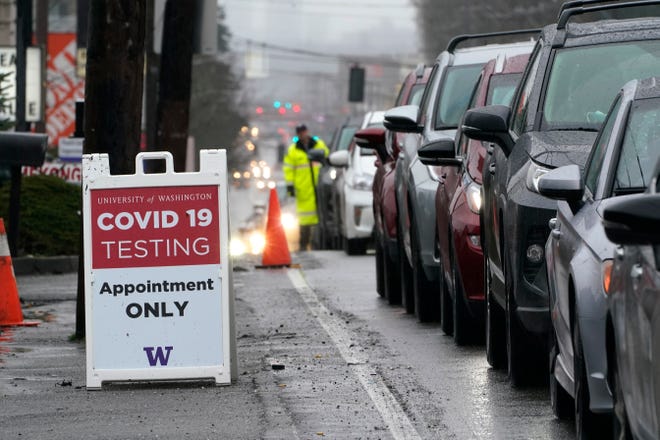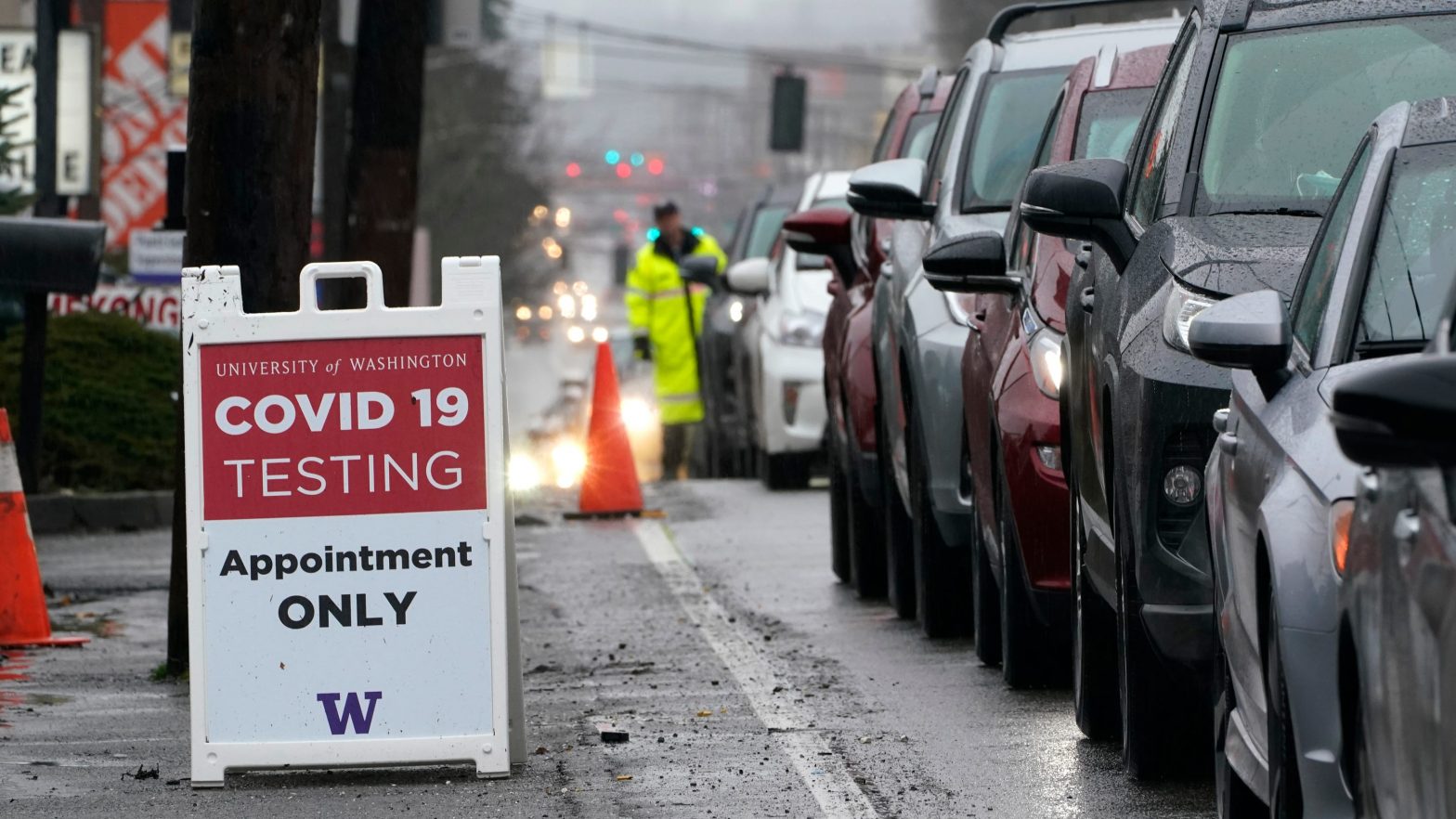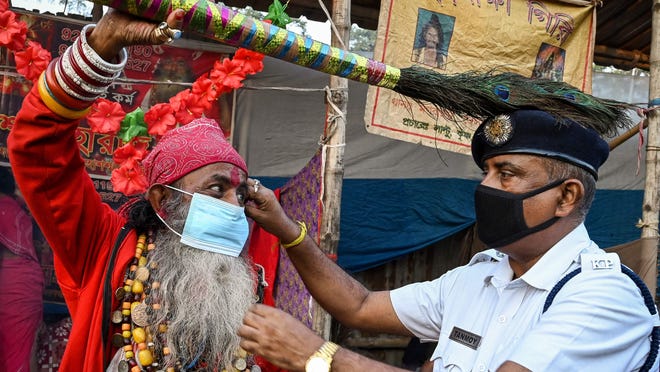America is again facing a COVID-19 testing crisis as many people are struggling to find at-home kits, scammers are profiting off fake rapid tests and some regions are limiting who can access community testing sites.
A massive winter surge in cases has fueled demand. More than 650,000 Americans are testing positive daily on average — about at 7.7 cases per second. But with tests in short supply, the true number of infections is suspected to be much higher.
Indiana is limiting who is eligible for rapid testing at state and local health department testing sites. San Diego health officials are urging residents to only get tested if they have symptoms. Some New York City testing sites are prioritizing testing teachers to keep schools open. And San Francisco will prioritize testing people with COVID symptoms over asymptomatic people.
The testing crunch comes as the Florida Department of Emergency Management announced that as many as 1 million rapid tests expired last month while sitting in a warehouse.
Adding to testing woes, the Federal Trade Commission warned Americans this week about fake at-home testing kits “as opportunistic scammers take advantage of the spike in demand.”
The agency urged people to make sure the test they are buying is authorized by the FDA by checking its official lists for antigen and molecular tests.
Meanwhile, a string of testing centers with minimal information and dozens of locations nationwide is receiving scrutiny from regretful customers and some authorities.
President Joe Biden’s announcement that the federal government will buy half-a-billion at-home rapid test kits offered some hope last month. But White House officials said it will still be several weeks before these kits will be available to be shipped.
Where to buy a COVID-19 at-home test:Here’s what to know and where to look
Also in the news:
► Tennis star Novak Djokovic was granted a medical exemption to compete in the Australian Open after he tested positive for COVID-19 last month and recovered. The No. 1-ranked tennis player, who has previously criticized vaccine mandates, was denied entry to Melbourne for failing to meet vaccination requirements and has since launched a legal battle ahead of the tournament this month.
► Congress will begin providing KN95 masks to staff members amid rising cases nationwide, the Washington Post reported. House officers were previously given surgical masks, which provide less protection than higher-quality K95 masks.
►A majority of the Supreme Court signaled Friday it is skeptical of the Biden administration’s authority to require millions of Americans who work for large companies to be vaccinated against COVID-19 or submit to weekly testing.
► A Florida Department of Health report issued Friday shows the state totaled nearly 400,000 new COVID-19 cases during the week that ended Thursday, according to News 4 JAX. In all, Florida has totaled 823,153 new cases during the past three weeks.
► An Alabama high school has switched to virtual classes this week after an outbreak of cases in the school’s 410-person marching band that led off this year’s Tournament of Roses Parade with “Yankee Doodle Dandy.”
► Students, staff and faculty in the University of Illinois system will be required to get a COVID-19 booster shot once they are eligible, school officials said.
► New York joined a handful of states in requiring booster shots for healthcare workers. Gov. Kathy Hochul said Friday too many workers are getting sick from breakthrough infections.
► The Food and Drug Administration on Friday said the time needed in between completing the first doses of the Moderna COVID-19 vaccine and a third, booster dose can be shortened to five months. A similar change was announced for Pfizer’s vaccine earlier this week.
📈Today’s numbers: The U.S. has recorded more than 59 million confirmed COVID-19 cases and more than 836,000 deaths, according to Johns Hopkins University data. Global totals: More than 302 million cases and 5.47 million deaths. More than 207 million Americans – 62.4% – are fully vaccinated, according to the CDC.
📘What we’re reading: What about us? The 16 million Americans who received the Johnson & Johnson vaccine are “questioning our protection” against COVID-19 – but stuck waiting for a third shot. Read the full story.
Keep refreshing this page for the latest news. Want more? Sign up for USA TODAY’s free Coronavirus Watch newsletter to receive updates directly to your inbox and join our Facebook group.

Royal Caribbean pauses some ship operations amid COVID surge
In the latest blow to the multi-billion dollar cruise ship industry, Royal Caribbean International is pausing operations on several ships due to COVID-19, canceling some sailings and pushing back one ship’s return to cruising.
While most cruises still haven’t been canceled, the Centers for Disease Control and Prevention advised against cruise travel in the coming weeks.
The Royal Caribbean news comes as the Ruby Princess Cruise ship — the same vessel that played host to a devastating coronavirus outbreak in 2020 — reportedly allowed a dozen infected passengers to disembark in San Francisco.
Between Nov. 30 and Dec. 14, cruise ships operating in U.S. waters reported 162 cases of COVID-19 to the CDC. Between Dec. 15 and Dec. 29, cruise ships sailing in U.S. waters reported 5,013 COVID-19 cases to the CDC. That’s nearly 31 times the number of cases reported in the first two weeks of December, the CDC said.
FDA warns against using throat swabs to test for virus
The U.S. Food and Drug Administration is cautioning Americans to use at-home COVID-19 tests as instructed, saying in a tweet that swabs should not be used to gather saliva from one’s throat.
Recently, as symptoms from the omicron variant shifted to include sore throat, swabs meant for nasal passages are instead being used as throat swabs.
But most U.S. at-home tests require nasal specimens. Tests that require saliva generally include spitting into a tube.
Chicago classes may be canceled into next week
Mayor Lori Lightfoot again blamed the city’s powerful teachers union for a third day of canceled classes in the nation’s third-largest school district Friday, but said she hopes to have a deal soon as negotiations over remote learning and other COVID-19 safety measures continue.
But some parents reported that individual schools’ principals already sent notices on Friday warning that they will not be able to hold classes on Monday. The district’s media staff did not immediately return an email and phone call about those reports.
Mayor Lori Lightfoot and Chicago Public Schools CEO Pedro Martinez issued a joint statement Friday evening saying “bargaining sessions continued today and went into the evening. The sessions remain productive but must be concluded this weekend.”
Lightfoot didn’t provide any other details about the ongoing talks between the Chicago Teachers Union and the district.
— Associated Press
Peru reports ‘flurona’ death: What you need to know about co-infection
Peru reported a death from “flurona,” a co-infection of the coronavirus and influenza, the Peruvian newspaper El Comercio reported Thursday. The fatality occurred in an 87-year-old man with co-morbidities who had not been vaccinated against either the flu or COVID-19, the newspaper reported.
While co-infections involving the flu are rarer than other viruses, health experts still expect to see rising cases of “flurona” as the U.S. approaches peak flu activity.
It’s unclear if “flurona” causes more severe disease, but vaccination against both viruses can help provide protection, health experts say. In general, immunocompromised people and younger children, whose immune systems are unfamiliar with many common viruses, are more at risk for co-infections. Read more about flurona here.
— Adrianna Rodriguez, USA TODAY
Pfizer-BioNTech COVID-19 vaccine delayed for youngest kids
Pfizer-BioNTech’s COVID-19 vaccine won’t be available anytime soon for kids younger than 5 years old.
In early tests, the lower dose given to 2- to 5-year-olds didn’t produce as much immune protection as did shots given to other age groups, a Pfizer scientist said at a federal advisory committee meeting Wednesday, expanding on information provided late last year.
The company hopes a third dose of vaccine eight weeks after the first two shots will provide the desired effectiveness, Dr. Alejandra Gurtman, vice president of vaccine clinical research and development for Pfizer said at a meeting of the Advisory Committee on Immunization Practices. But that means waiting until late March or early April for results, she said, allowing time for children in the trial to get a third shot and then have their immune responses tested.
“This might be a three-dose vaccine,” Gurtman said, adding that Pfizer-BioNTech is testing a third dose in children ages 5 to 12, as well. The vaccine has been shown to be safe in younger children, she said, as it was for older children and adults.
Contributing: Shari Rudavsky, IndyStar; Hannah Leyva, Sarasota Herald-Tribune; The Associated Press

